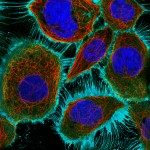Link to Pubmed [PMID] – 33393173
Link to DOI – 10.15252/embr.202050965
EMBO Rep 2021 Feb; 22(2): e50965
Proteins of the ADF/cofilin family play a central role in the disassembly of actin filaments, and their activity must be tightly regulated in cells. Recently, the oxidation of actin filaments by the enzyme MICAL1 was found to amplify the severing action of cofilin through unclear mechanisms. Using single filament experiments in vitro, we found that actin filament oxidation by MICAL1 increases, by several orders of magnitude, both cofilin binding and severing rates, explaining the dramatic synergy between oxidation and cofilin for filament disassembly. Remarkably, we found that actin oxidation bypasses the need for cofilin activation by dephosphorylation. Indeed, non-activated, phosphomimetic S3D-cofilin binds and severs oxidized actin filaments rapidly, in conditions where non-oxidized filaments are unaffected. Finally, tropomyosin Tpm1.8 loses its ability to protect filaments from cofilin severing activity when actin is oxidized by MICAL1. Together, our results show that MICAL1-induced oxidation of actin filaments suppresses their physiological protection from the action of cofilin. We propose that, in cells, direct post-translational modification of actin filaments by oxidation is a way to trigger their disassembly.

